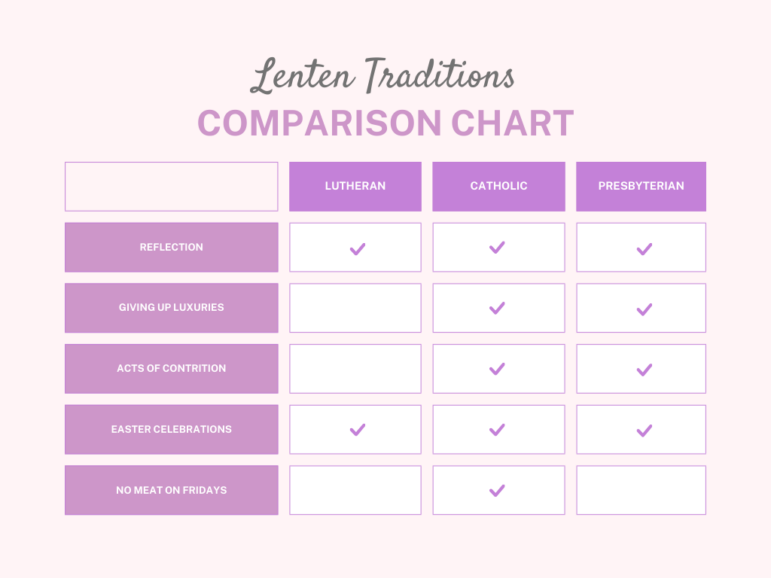Who celebrates this subtle springtime season?
What do Catholics, Lutherans, and Presbyterians all have in common? All three religions are Christian denominations that observe the holiday known as Lent. Although they aren’t the only groups who celebrate Lent, these three religions are some of the most prominent sects to participate in the holiday.
What is Lent?
The general consensus among all three groups is that Lent is a 40-day-long holiday that begins on Ash Wednesday and ends on Holy Thursday. During that period, Christians reflect on the life and death of Jesus in preparation for the Easter season.
“Lent is a time to remember Jesus’ path to the cross where he suffered,” said Dietrich Ragner, a Lutheran congregant.
Those definitions encompass most of the three denominations’ generally shared beliefs. Besides that, every aspect of the holiday—including Lent’s true purpose and meaning—is slightly different depending on the denomination in question.
Why do people celebrate Lent?
While there are many different reasons people celebrate the holiday, Lent is about reflecting on the life of Jesus and the ways he suffered. But in Presbyterianism and Catholicism, there’s also an element of sacrifice involved with the season.
“People usually make some kind of sacrifice, or they give something up,” said Grace Crandall, a Catholic congregant.
The Presbyterians’ reason for making sacrifices comes from a Biblical story about Jesus, where he remained in the wilderness for 40 days and 40 nights while resisting the temptation of the devil.
“You give up something to signify how Jesus gave up something,” said Margaret Lupton, a Presbyterian congregant. “It’s to help prepare yourself for a difficult journey.”
Lutherans have a slightly different perspective on the celebration of Lent.
“Jesus’ whole purpose was to come and live a perfect life in our place,” said Ragner. “So, it’s going over what he did when he lived a perfect life, and his eventual suffering for his death.”

How do people celebrate Lent?
The most common and well-known way to celebrate Lent is by giving up a luxury or worldly desire like drinking coffee or online shopping. Catholics have arguably the strictest rules for Lenten sacrifices. This includes the previously mentioned personal sacrifices, not eating meat on Fridays, fasting on the first and last day of Lent and performing the Stations of the Cross on Friday evenings. On the other hand, Lutherans aren’t required to make sacrifices during Lent.
“We aren’t against other people giving up stuff during Lent,” said Ragner. “The idea that you’re giving something up for Lent is fine, as long as it’s something that helps you remember what Jesus did for you. But if you give up something for Lent with the idea that you yourself are earning your way into heaven, then that becomes a problem.”
What about Easter?
This year Lent began on Ash Wednesday, Feb. 14, and will conclude on Holy Thursday, March 28. Easter occurs three days after Lent, this year on March 31.
Regardless of their denomination, every family celebrates Easter in their own unique way. Ragner’s family used to have egg hunts and Crandall has a large Easter dinner after going to mass.
But Lupton and her family participate in an Easter tradition specifically tied to the sacrifices they made during Lent. Depending on what Lupton and her sister gave up for Lent, they would receive Easter baskets containing things they gave up. Including the time her sister gave up ramen noodles for Lent and found a special Easter basket waiting for her that morning.
“She had packs of ramen noodles in her Easter basket that she ate at 8 a.m. on Easter Sunday,” Lupton said.
Because Easter is a joyous celebration, some people get frustrated or impatient during Lent while waiting for Easter to come. But not everyone feels the same way.
“I’ve spoken to people about who like or enjoy Lent,” said Crandall. “But they aren’t ever like, ‘It’s always been that way.’” They always have a story like, ‘It took me years to truly appreciate the meaning of Lent.’ So, I hope I also get there one day because it’s definitely a slow journey.”